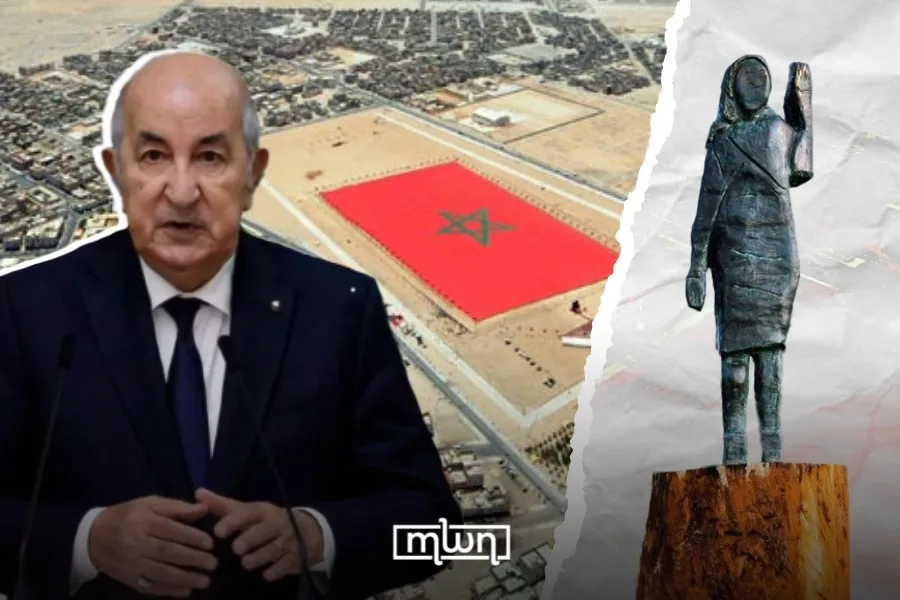Rabat — Political tensions between Morocco and Algeria took a strange turn this week when Melania Trump’s bronze statue vanished last Tuesday from Sevnica, her hometown in Slovenia, during Algerian President Abdelmadjid Tebboune’s official visit.
Tourists visiting Sevnica found only an empty pedestal where Melania’s wooden likeness once stood, with local media reporting that perpetrators sawed off the statue at the ankles and removed it.
Slovenian police launched an investigation into the statue’s disappearance from its base near Sevnica town, while President Tebboune concluded what officials called an “economic cooperation” visit to the small European nation.
Commenting on the incident, Algerian political analyst Oualid Kebir stressed the obvious: the timing of this odd disappearance is not coincidental. Instead, Kebir suggested, Algerian intelligence orchestrated the strange theft as part of a three-step plan to reverse Donald Trump’s support for Morocco’s sovereignty over the Western Sahara region.
“This looks like a political stunt designed to create a diplomatic opening,” he said. “The plan apparently involves returning the statue with great fanfare to gain favor with the Trumps.”
According to Kebir, the second stage of Algerian intelligence’s uncanny plan is for Algeria’s state television to come out, after days of silence about the strange incident, with a dramatic announcement claiming Algerian security services “recovered” the statue from international art thieves.
The alleged scheme mirrors past attempts to influence foreign leaders through personal connections, he wrote. Algeria employed similar tactics during François Mitterrand’s presidency in the 1980s, cultivating a close relationship with the French president’s wife, Kebir recalled.
“Tebboune’s visit to Slovenia wasn’t about discussing gas or signing protocols,” he wrote, adding that it “was simply the first episode in a ‘secret bronze operation.’”
Kebir suggested that Algeria’s alleged strategy of trying to reach the American administration through President Trump’s wife, Melania, is “not a new idea but an old one.”
“Algeria has been unable to employ parallel diplomacy professionally,” Kebir said in a statement to Morocco World News (MWN), adding that “even its official diplomacy has become ineffective and lacks real influence.”
The operation aims to influence “the American decision regarding the Moroccan Sahara issue,” he offered, noting that “from Danielle to Melania… nothing has changed and nothing will change in favor of the Algerian military!”
The Western Sahara dispute remains a contentious issue between Morocco and Algeria. Trump recognized Moroccan sovereignty over the territory in December 2020, a position Algeria has tirelessly — though ultimately successfully — worked to reverse in the past years.
In contrast, the analyst commended Morocco’s professional parallel diplomacy, which, according to him, has yielded tangible results for the North African country.
“Morocco employs parallel diplomacy in a professional manner,” leveraging multiple influential channels including the Moroccan diaspora, non-governmental organizations, think tanks, and economic actors.
“The results became evident in the last five years,” he noted, pointing to major diplomatic breakthroughs including “U.S. recognition of Morocco’s sovereignty over the Sahara, Spain’s correction of its position, French recognition of Moroccan Sahara, the opening of consulates, and multiple countries withdrawing their recognition of the ‘illusory republic’ [Polisario].”
Kebir attributed these successes to a well-harmonized dual approach: “There is official diplomacy led by His Majesty the King, but parallel diplomacy has played a significant role” in advancing Morocco’s position on the Western Sahara dispute internationally.
Morocco’s Sahara Momentum and Algeria’s Hostile Agenda
Shifting from a reactive to a proactive stance regarding the Western Sahara dispute, Morocco’s sovereignty over its southern provinces has gained more international endorsement in the past few years.
The North African country has reinforced its foreign diplomacy, redefining its alliances and calling for a clear stance on its sovereignty over Western Sahara. Morocco has conducted bulk investment through its sustained development efforts in its southern provinces.
Rabat has shown growing confidence in the strength of its Autonomy Plan Initiative. As a result, Morocco has been reaping the fruits of its diplomacy, gaining traction among international actors, and endorsing the plan as a realistic and serious solution to the long-standing dispute.
Morocco has opted for a strategy to shape its path concerning Western Sahara, instead of waiting for the often-stalled UN-led political process to deliver progress.
Morocco’s strategy relies on deepening and diversifying partnerships with African, Arab, and Western countries, many of which have shown clear support by opening consulates in Laayoune and Dakhla.
Meanwhile, the UN’s Sahara envoy’s latest comments align more closely with practical, compromise-based solutions, implicitly bolstering Morocco’s position while sidelining calls for a referendum.
Algeria’s entrenched plan against Morocco’s territorial integrity
This flurry of explicit and implicit international embrace of Morocco’s territorial integrity comes as Algeria maintains an entrenched and hostile position toward Morocco’s territorial integrity.
Over the years, this sustained hostility has been driven by both historical rivalries and ideological opposition to Morocco’s monarchical system and growing regional influence.
Algeria’s political narrative, often veiled in the language of self-determination, has not adapted to the shifting international consensus that increasingly views Morocco’s autonomy proposal as a pragmatic and stabilizing solution.
Instead, as Kebir suggested, Algeria continues to rely on outdated ideological frameworks, rejecting meaningful compromise and promoting a separatist vision that no longer finds wide support outside a few isolated voices.
This was on full display in recent months as Algiers clashed with Paris following France’s recognition of Morocco’s sovereignty over Western Sahara.
Algeria’s refusal to acknowledge Morocco’s historical ties to the Sahara and its rejection of integration initiatives have deepened the divide between the two neighbors, leaving the region fragmented.
As the situation deepens, many observers lament that this entrenched inability to move past inherited colonial boundaries and mutual distrust has deprived both countries — and the broader region — of the economic and strategic benefits of cooperation.
Yet the balance of momentum now favors Morocco, whose pragmatic diplomacy, institutional reforms, and on-the-ground development in the Sahara provinces have rendered its claim more credible and tangible than ever.
